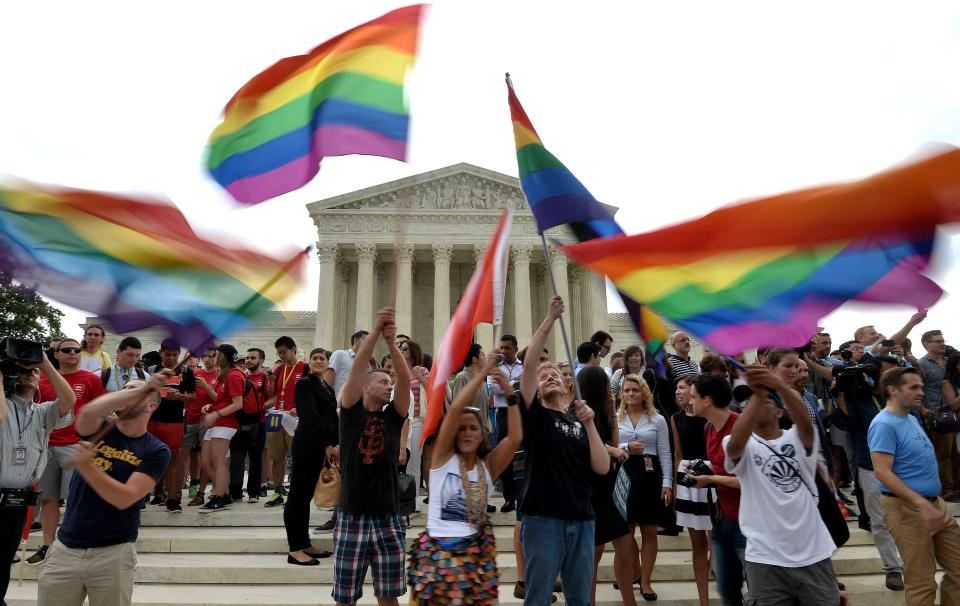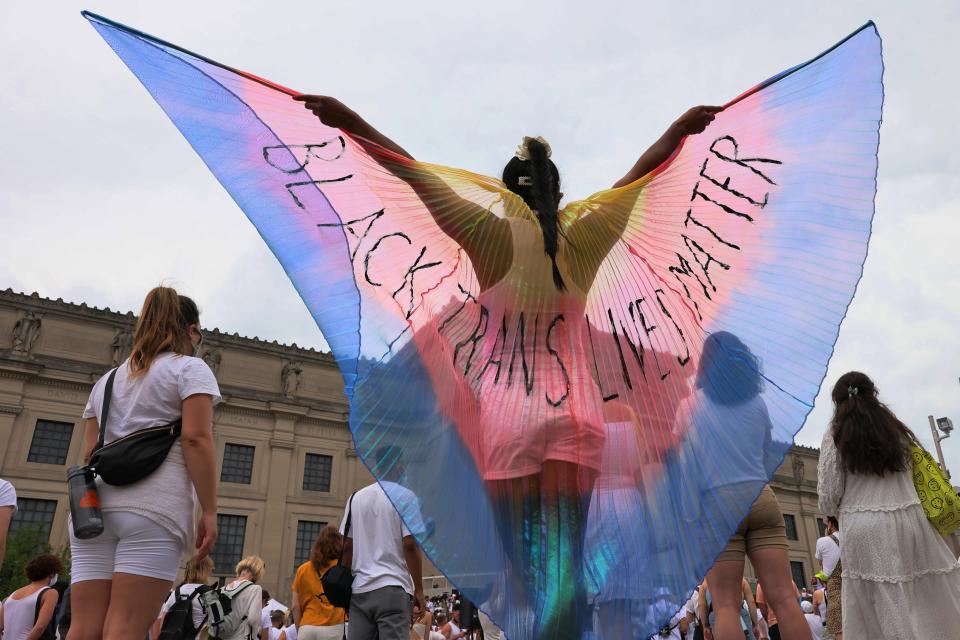We misremember marriage equality as 'easy' fight. But it paved the way for trans rights.
Twenty years ago this week, the Massachusetts Supreme Court ruled, for the first time in American history, that same-sex couples were entitled to the freedom to marry in a trail-blazing case brought by GLBTQ Legal Advocates & Defenders. These days, the two of us often hear how speedy – even easy – that fight was, compared with today’s efforts to win freedom for transgender people.
But that’s a misreading of history. It forgets how politicians at every level of government either ran from the issue of marriage or weaponized it. And through that misremembering, it makes the fight for transgender equality seem exponentially more difficult, perhaps even impossible, given today’s attacks on trans kids’ ability to access health care, play sports and be respected in school. With a truer memory of the marriage fight – the deep resistance and the strategies that enabled victory – we’re confident we will also win full equality for transgender people.
On marriage, our community’s demand was audacious: Let a stigmatized group join a most cherished institution. Opposing forces – including the Catholic Church hierarchy, the Mormon Church and evangelicals across faiths – vowed that allowing same-sex couples to marry would destroy the institution of marriage, harm children and irreparably damage society. In response, President Bill Clinton signed the federal Defense of Marriage Act in 1996, President George W. Bush pushed for a federal constitutional amendment banning marriage for same-sex couples in 2004, and it wasn’t until 2012 – after same-sex couples were marrying in six states and D.C. – that President Barack Obama voiced support.

The battle for trans rights won't be easy
The truth is that a battle over acceptance of difference, on something as fundamental as gender or marriage, is never easy. As Frederick Douglass said, “power concedes nothing without a demand. It never has and it never will.” On the hopeful side of the equation, Americans overwhelmingly believe in the Golden Rule – treating others the way we want to be treated – but to get people to apply it to specific groups of people, they need to be able to genuinely empathize and connect. This can be especially difficult when opposing political strategists seek to score points by sowing fear of the other.
The good news: Trans advocates, working bravely and smartly for decades, have made tremendous strides in demonstrating the dignity of trans people, including young people. Polling shows 64% of Americans favor laws protecting transgender people from discrimination, and 22 states have passed trans-inclusive nondiscrimination laws. Supreme Court Justice Gorsuch, joined by Kavanaugh and Roberts, wrote in Bostock that trans people deserve protection from workplace discrimination.

President Joe Biden has been a stalwart champion for trans people. And Republican governors in deep red states – including the governors of Utah and Arkansas, issued heartfelt statements while vetoing cruel anti-trans measures.
As we face anti-trans attacks, we should apply more of what’s gotten us so far on nondiscrimination for transgender people and was so central to the success of the marriage movement.
Starbucks gave trans employees lifeline. Then they put our health care at risk.
Sharing trans stories will win hearts and minds
First: We must share our stories. The public needs to know trans people not as “those people somewhere far away,” but as people in our communities. That means introducing more transgender people to the public and empowering allies like medical professionals, faith leaders and family members from all walks of life – religious, conservative, rural, you name it – to speak out and vocalize their support. We’ve seen that often, people can identify more with the stories of parents with gay or trans kids, for instance, than with gay or trans people themselves. And that’s okay – after all, our goal is to move folks toward understanding.
It’s also critical to recognize that people take a while to understand – and that, too, is okay. We need to normalize, not punish, that sense of unfamiliarity in order to combat the rampant misinformation being spread by anti-transgender extremists.
How far we've come: Respect for Marriage Act is a triumph for families, freedom – and American activism
In the marriage work, we saw people’s internal conflict as an opportunity to take them on a journey to a place of support. Similarly, we want people to see how their own personal values lead them to embrace dignity and freedom for transgender people. Let’s answer folks’ real questions, have parents model their journey stories, and elevate professionals who know the science. And let’s stop thinking of people with conflicted feelings around transgender rights as being against us and start thinking of them as people who are not yet with us. Writing people off may be popular on social media – but it alienates people rather than accelerating their evolutions.

Perhaps the most important lesson is that to win, we must never, ever give up. If we continue to harness the power of our stories, respect the journeys that people are on, and make sure a variety of voices are heard to reach the cross-section of America, we will prevail. On the marriage journey, there were many points where our ostensible allies pushed us hard to stop. But we kept going, using the approaches that brought people, legislatures and presidents our way.
Winning is neither impossible nor inevitable. We must push through this painful period, remember the victories that we’ve been racking up and keep our heads up, forever staying focused on our goals of freedom and equality for all.

Rodrigo Heng-Lehtinen is the Executive Director of the National Center for Transgender Equality. Marc Solomon, a partner at Civitas Public Affairs Group, was national campaign director of Freedom to Marry. He is the author of "Winning Marriage: The Inside Story of How Same-Sex Couples Took On the Politicians and Pundits – and Won."
You can read diverse opinions from our Board of Contributors and other writers on the Opinion front page, on Twitter @usatodayopinion and in our daily Opinion newsletter. To respond to a column, submit a comment to letters@usatoday.com.
This article originally appeared on USA TODAY: Amid anti-trans attacks, same sex marriage victory holds lessons, hope


